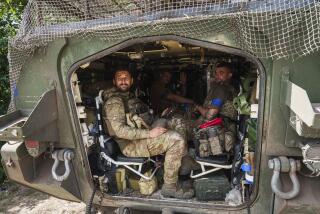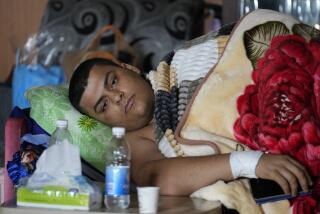Iraq bombing kills 70; 182 injured
- Share via
TAZA KHURMATU, IRAQ, AND BAGHDAD — A suicide truck bomb killed at least 70 people Saturday and wounded 182 in a primarily Turkmen town in northern Iraq, less than two weeks before the scheduled withdrawal of most U.S. forces from the cities.
The bombing, which could exacerbate ethnic tensions in the volatile Kirkuk region, came as Iraqi Prime Minister Nouri Maliki warned that more attacks were expected as U.S. soldiers exit urban centers.
Residents of the Shiite Turkmen town of Taza Khurmatu, about 10 miles south of the city of Kirkuk, had just finished prayers at a mosque when the attacker detonated his explosives-laden truck.
Witnesses said the blast leveled more than 80 clay brick homes and damaged the mosque. Rescuers dug through mounds of rubble looking for the wounded and pulling out the dead.
Medical officials said at least 70 people had been killed and 182 wounded and they worried that the casualty figures would rise. The bombing is the latest in a series of attacks on northern Iraq’s Turkmen minority since 2003.
Taza Khurmatu sits in an oil-rich area home to a combustible mix of Arabs, Kurds and Turkmens. Kurds wish to annex the Kirkuk region to Kurdistan, their semi-autonomous zone in northern Iraq. Arabs and Turkmens fiercely oppose such a move. Outside experts worry that the competition for control of the region could spark communal violence.
“The impact of the blast threw me into a store. A big fireball was coming my way,” Mohammed Bashir said from his hospital bed in Kirkuk. Three of his relatives were killed, he said.
Bashir demanded to know why his rural district had been targeted again and asked that the U.S. military not reduce its troop presence in the area.
“We demand for the American forces to stay because their withdrawal means the return of Al Qaeda and . . . the return of sectarian war in all parts of Iraq, even after the relative security improvements,” he said.
“This explosion is only the start,” he added. “We will see more. What will happen later after the pullout of American forces? It will be even worse.”
Turkmen politician Ali Mehdi, who sits on Kirkuk’s provincial council and is a leader of the Kirkuk branch of the Turkmen Front party, called on Baghdad to give his community its own security force to protect its villages, as opposed to relying on mixed Arab, Kurdish and Turkmen forces.
“The incident is related to the security profile and the withdrawal of U.S. forces. We demand the prime minister establish a special Turkmen security force to protect and safeguard the Turkmen people,” Mehdi told the U.S.-funded Alhurra satellite news channel. “We blame [the attack on] sides that don’t want to grant the Turkmen people freedom and foreign sides that might want Iraq and Kirkuk unsettled.”
The last year has seen U.S. forces in the north increasingly play the role of mediator as Baghdad and the region’s emboldened Arab population have asserted themselves against the Kurds. Kurdish fighters and intelligence agents help police parts of Kirkuk, Diyala and Nineveh provinces, with the aim of eventually appropriating areas they say were taken from them under Saddam Hussein’s regime and his policy of Arabization.
Baghdad is now demanding that Kurdish fighters, called peshmerga, withdraw from areas outside Kurdistan. Maliki also has begun replacing Kurdish officers, who had dominated Iraqi army leadership positions in the north.
It is unclear how active a role U.S. forces will be able to play in the north after they pull out of Iraqi cities at the end of the month. Both American and Kurdish officers have worried about the potential for a miscalculation setting off fighting between Kurdish fighters and Iraqi army units.
Earlier Saturday, Maliki touted the scheduled June 30 departure, calling the day a “big wedding” for Iraqis but warned that the state’s enemies would test Iraq’s security forces. Last week, a car bomb killed more than 30 people in a town outside Nasiriya in southern Iraq, which has been mostly quiet.
“Don’t feel strange if attacks take place here or there. They will not get what they want; you will see what our forces will do,” Maliki said in remarks broadcast on state television.
In Taza Khurmatu, residents found little consolation as they wandered the landscape of flattened homes.
“Whole families perished and were buried,” said Hussein Baktash. “Look at the destroyed houses. Nothing indicates that innocent people were living here an hour ago. Everything has been devastated. Everything is gone.”
“Nine members of my family are dead,” he added. “Nothing is left from them but my little daughter Umm Al-Baneen’s doll. She was born 7 months ago and now she is all but a memory.”
He sat down in the dirt where his house had been and started crying and calling his daughter: “Where are you now? Where are your brothers and sisters? I’m all alone now in this world.”
He walked past what was left of the walls.
“Here we used to sleep and here we used to eat. Here my daughter Zahra used to run behind me and play with her siblings. What kind of religion [do the attackers follow]? And what kind of humanity [do they have]?”
Nearby, dead chickens and cows were scattered in the debris along with children’s toys. Residents continued to dig with shovels hoping to find their loved ones as bulldozers ripped away dirt.
By 6 p.m., the bodies of nine women and children had been carried out.
“This attack is genocide,” said resident Talal Bassim Askar.
--
Windawi is a special correspondent. Times staff writers Saif Hameed, Caesar Ahmed and Usama Redha contributed to this report
More to Read
Sign up for Essential California
The most important California stories and recommendations in your inbox every morning.
You may occasionally receive promotional content from the Los Angeles Times.










